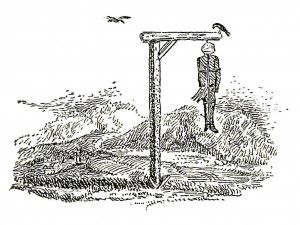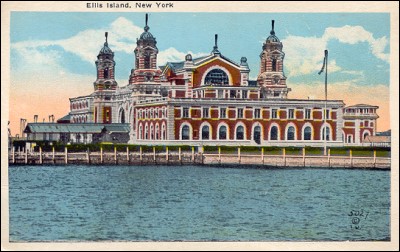Washington Irving, Gibbet Island, and Jersey City
My post from last summer examined the connection between Washington Irving, America’s first international author and a connoisseur of Dutch culture, and the village of Communipaw—a part of contemporary Jersey City.
This post has proven to be my most read piece with visitors from around the globe, illustrating the power and the possibility of culture—whether it be art, literature, music, or cuisine–to transcend nationality, race, religion, and ethnicity. Although culture is often mocked by power and society (including President Obama, disappointingly enough), culture does not only enrich individual lives, but it intellectually and even spiritually serves as the bedrock of civilization. If a society does not value culture, what might it become? ISIS is the most horrific contemporary example.
But I digress.
Although a consummate man of letters writing about a breathtaking range of subjects in his own time, today Washington Irving is remembered in America as teller of ghost stories. Every grade school student reads “The Legend of Sleepy Hollow.” Recently, I read another ghost story penned by Mr. Irving. “The Guests from Gibbet Island” is set in the vanished village of Communipaw, a preserve of Dutch burghers and more amenable manner of life, at least in Irving’s imagination.
The story centers around an abandoned tavern in Communipaw. Yan Yost Vanderscamp, the nephew of the owner, disappears on the waters of the Hudson River and reappears in an equally mysterious fashion to claim his inheritance. The nephew regular ventures out to sea and later returns in the company of disreputable, destructive fellows. Rumors swirl about the village, speculating that Vanderscamp is a pirate and possibly even Captain Kidd himself (The story alludes to New Jersey’s place in pirate history. Several years ago, Weird New Jersey, the chronicler of all bizarre Jerseyana, explored this topic in depth). Ultimately, Vanderscamp tempts the dead with a sacrilegious scoff. I’ll let you guess at the rest of the tale …
Aside from its vivid writing and fluid style, several specific details of “The Guests from Gibbet Island” grabbed my attention.
Where and what was Gibbet Island? Gibbet Island sat in the Upper Newark Bay and off the coast of today’s Jersey City. The island was the site of the state executions of convicted criminals. These criminals were hanged on gallows or a gibbet.

Public Hanging (Courtesy of Early American Crime)
Hence, the name Gibbet Island. Today, we know Gibbet Island by a different name. Ellis Island.

Ellis Island (Courtesy of New York Architecture)
A less gruesome, yet intriguing aspect of the story is the abundance of nature surrounding Communipaw and its close proximity to marshes, waterways, and wildlife. Pluto, a peculiar character and unfortunately an early racial stereotype of Africans, spends his leisurely hours “fishing, crabbing, or grabbing for oysters.” Although we rationally understand that Jersey City (and the entire New York metropolitan region) was once largely unpopulated and its landscape consisted of virgin nature, we find these facts almost incomprehensible and beyond the powers of imagination.
Culture has the power to break such a mental logjam. This is what a story, a painting, or a song allows us to do: open a door in our minds, see what is past, and experience a world far beyond our own understanding.